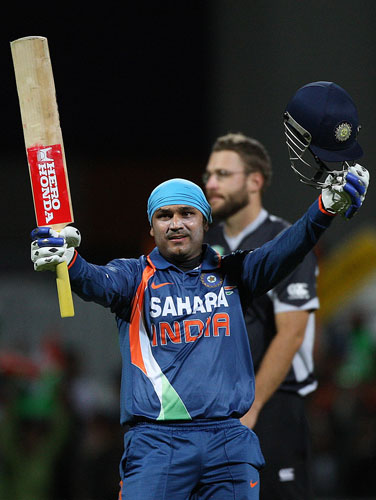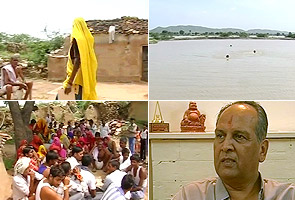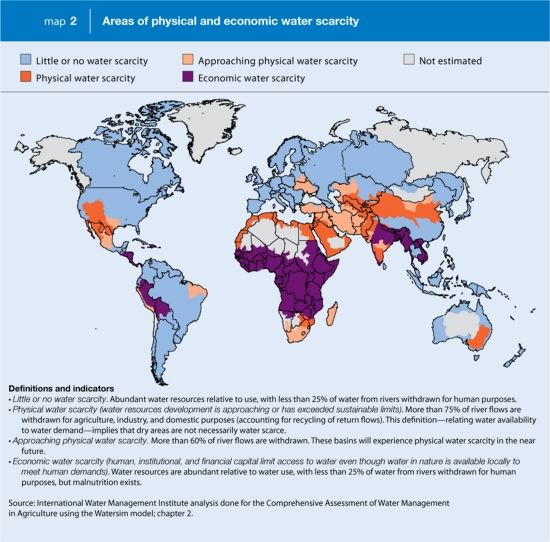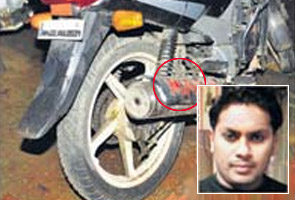Friday, August 27, 2010
Saina crashes out of World Championships
Avoid Salmonella From Eggs: 4 Steps to Take Now
But the big news this week about salmonella outbreaks linked to eggs—380 million have been recalled and counting—should serve as a wakeup call for prevention. Sure, our government must investigate what's going on in the henhouse, but we should also remember to treat raw eggs like raw chicken: wash our hands after handling them and only eat them when they're cooked.
[4 Harmless Acts that Could Give You Food Poisoning]
Sounds simple right? After all, most of us, save for Rocky wannabes, don't gulp a glass of raw eggs for breakfast. But we do make eggnog with uncooked eggs. (Thank goodness it isn't holiday season.) And many of us can't resist licking cake batter or sampling cookie dough. Plus, let's not forget the dressing and sauce recipes that call for raw eggs: Caesar salad dressing; Béarnaise sauce; Hollandaise sauce; mayonnaise.
Restaurant fare that contains undercooked or mishandled eggs, however, may be trickier to avoid. The Los Angeles Times reported Thursday that California high school students developed severe stomach aches in May after eating custard-filled pastries at a catered prom dinner, while a woman in Wisconsin got a high fever and diarrhea after eating a Cobb salad; in both cases, the eggs in their food came from the same farm in Galt, Iowa. The Centers for Disease Control and Prevention said it received nearly 2,000 reports of salmonella poisoning from May through July compared with the usual 700 cases seen in previous years, which spurred the agency to start investigating, and led to this week's massive egg recall.
[Photo Gallery: Where Your Food Comes From]
While sometimes it's impossible to avoid contracting salmonella from eggs, taking precautions can help lower your risk. The CDC offers some basic prevention tips on its website like keeping eggs refrigerated at all times, discarding cracked or dirty eggs, and washing hands, utensils, and surfaces after contact with raw eggs. But some of the agency's tips need a little more clarity. These include:
[The Basics on the Food Fight Over Irradiation]
1. "Eggs should be cooked until both the white and the yolk are firm." In other words, solid. Avoid soft-boiled eggs, runny scrambled eggs, and eggs prepared sunny side up.
2. "Refrigerate unused or leftover egg-containing foods promptly." No, that doesn't mean you have to refrigerate every loaf of bread, cake, or muffin that's baked with eggs. But you should store the egg salad, casseroles, and quiches at once, or at the very least, don't leave them outside the fridge for more than two hours.
3. "Avoid eating raw eggs." That means no raw cake batter, cookie dough, or Rocky-style shakes. Got that?
4. "Avoid restaurant dishes made with raw or undercooked, unpasteurized eggs." This may be a bit tough because it requires you to grill your waitress, who may have to go into the kitchen to ask the chef, who may be less than thrilled. But it's certainly important, since restaurants tend to be a prime source of food poisoning outbreaks. Ask if any sauces or dressings that traditionally use raw eggs, such as Hollandaise sauce or Caesar salad dressing, use pasteurized eggs; these, like the egg whites you buy in a carton, are heated to temperatures high enough to kill salmonella. Otherwise avoid them. Be sure to also check the dessert menu: mousse, meringue, and tiramisu sometimes also contain uncooked eggs.
Source URL
Live Nation's tin ear
Its stock continues to drown in the shallowest pool. And its management acknowledges plenty more challenges ahead, noting that the second half of the year could bring another 15% swoon in concert attendance on top of the 12% decline the industry has already had. So it is somewhat startling that a few well-heeled investors and hedge funds have kept to their bets on a turnaround.
Although Greenlight Capital's David Einhorn threw in the towel on Live Nation in April, John Malone's Liberty Media is sticking with it. Others have joined in as well. This August, Farallon Capital Management disclosed it had picked up 900,100 shares of the company, and small-cap value investors at Shapiro Capital, while no fan of Live Nation's successful merger with Ticketmaster earlier this year, continue to hold nearly 8 million shares. Tiger Global Management controls 11.2 million shares, and Stephen Mandel's Lone Pine Capital has bought about 9.6 million shares.
It's unclear what these investors see that others don't, although perhaps Live Nation's stock -- which trades at less than a quarter of the price of an average Live Nation concert ticket -- might seem just too cheap to pass up. Corsair Capital Management, another fund that has raised its stake in the ticketing and promotion behemoth, recently opined in an investment letter that Live Nation might finally have its "secular tailwinds at its back," and that it was now trading at an "attractive price for an oligopolistic business with modest capital requirements."
However, a bet on Live Nation is in many ways a bet on its ability to execute on a planned expansion overseas. As Live Nation has noted, the North American market is generally unappealing these days. American fans aren't willing to pay what they once did to see many of their favorite acts, there are not a lot of great new venues to tap, and the talent demands an ever-larger cut of the concert pie. "Jay Z doesn't care if he plays in Paris or Denver, but we do," explained Live Nation CEO Michael Rapino during the company's uneven investor day pitch last month. "We make more money in Paris."
That is why Live Nation plans to shift its focus to what Rapino describes as "less sophisticated" markets, with the idea of expanding into around 75 live-performance markets overseas. The concert market there is certainly in better shape than the one here at home. Pollstar, which tracks the concert industry, recently reported that top concerts in South America, Australia and Europe continued to gross about what they did last year, about 15% more than they did in the U.S.
Cheaper artists + expensive tickets = international success?
According to Live Nation's own data, there is easy money to be made overseas. Fans there are willing to pay about $4 more on average for a ticket than fans in the United States and the artists toiling on stage, on average, are willing to work for at least 19% less of the take.
"It is an open world now. This market is on fire on a global basis," said Rapino, adding that Latin America was also hot and that Live Nation was in Dubai "every day of the week...talking to somebody about a deal."
But, in his excitement, Live Nation's CEO may not be taking into account that the markets targeted are already being serviced by other large and successful concert promoters and ticket sellers. And those competitors have largely avoided the public relations baggage that has hit Live Nation from a myriad of issues, including cancelled concerts, angry fans, investigations of anti-competitive maneuvers and allegations of unlawful profits.
There may be, as Rapino believes, more than 124 million tickets to be sold in places like France, Australia, Belgium, Switzerland, Germany and Spain. But even in countries where Live Nation had years of experience, inroads have been difficult, with Live Nation data showing only about 3% penetration in Spain after a good four years of trying. And so far this year, it's performed worse in overseas markets than it has in the U.S. by some measures. While Live Nation ticket revenue was almost flat in the U.S., it was down about 12% overseas.
That's not all. Live Nation has sold fewer tickets internationally so far this year (9.7 million compared with 12.9 million in 2009) even as competitors such as US-based AEG-Live, Germany's Marek Lieberberg, South Africa's T4F, and the UK-s 3A all reported strong gains, according to Pollstar. The concert industry publication's data also showed AEG Live-affiliated companies produced 46 of the top 100 grossing concerts, compared to Live Nation's mere 27.
If Live Nation can't make inroads overseas, it will have to play especially nice with fans back at home to rebuild its tarnished image. Already, in an attempt to fill empty arenas, Live Nation has begun to discount more tickets and pitch others as 'free of service fees.' It has also moved to reduce or do away with some fees (such as the absurd payment for printing a ticket at home), tried to make it easier for customers to get the seats they want, and worked to fortify its customer "bill of rights."
Rapino says that Live Nation needs to begin treating consumers with the respect they are due. But the sense one gets from hearing Live Nation's management talk during its investors conference is that they still often see their customers as little more than stacks of money ready to slice and dice.
Live Nation doesn't believe it should have to reduce what it takes in at a concert to appease fans and fill arenas. Instead, it can force the artist to take the hit, and then dynamically price the tickets so that the front rows pay even more, helping to offset any loss inflicted by the cheapskates that wait around for $10 seats at the rear. The artist's share might suffer, but Live Nation, it seems, can never lose.
Like the egotistical, often childish and un-repentant Rock & Roll artists its management arm sometimes represents, Live Nation doesn't take full ownership of its problem, one highlighted by Pollstar editor Gary Bongiovanni when he wrote that the concert industry was, in a sense, killing itself. Fans still want to see live music, he said, despite "piggish, top-tier prices," "add-on fees," the availability of "discounted tickets after they have paid full price" and other "misguided efforts to squeeze the fun out of the experience."
Live Nation sees such maneuvers as part of its salvation, while blaming a moribund economy, a yellow press, greedy touring artists and half-witted investors for much of the company's malaise.
"From the tone of the questions, I don't think you guys out there really get the message that we are trying to do today," snapped Live Nation Chairman Irving Azoff at one point during the company's investor conference, adding that a few pointed questions about the company's financial difficulties, litigation risk and international rollout made him think that "maybe we've got a bunch of short term investors that need to think longer term."
Given Live Nation's recent history and performance, and its difficulty in articulating how it will reach its goals for the future, some investors and fans might think Live Nation should do the same.
Source URL
Jet Airways rise over 3% on fund raising plan
Shares of the private air-carrier climbed 3.34 per cent to an early high of Rs. 807.10 on the Bombay Stock Exchange.
The scrip saw a similar move on the National Stock Exchange and gained 3.59 per cent to trade at Rs. 807 in morning trade.
Meanwhile, the broader gauge sensex was quoting flat at 18,220.20, down 0.03 per cent from previous close.
The airline, yesterday, said it is looking to raise USD 400 million through a share sale to foreign institutions and has also approached RBI to relook at some of the external commercial borrowing (ECB) guidelines for raising funds.
Jet Airways Chairman Naresh Goyal also said that the company has sought the government permission to dilute up to a 20 per cent stake but he is not talking to any investor, as existing regulations do not allow it.
Source URL
BCCI to file criminal case against Modi?
Modi was suspended after IPL 3 concluded, following allegations of financial irregularities in the Twenty20 league. The BCCI has set up a disciplinary committee to probe charges of irregularities by Modi, who has so far stayed away from the hearings citing security reasons and threat to his life from the underworld.
The case will be filed for Modi's alleged Foreign exchange violations amounting to Rs 125 crore, this amount is said to be the felicitation fee from the IPL to World Sport group.
Incidentally, it's the first criminal case filed in a court of law since the controversy broke, that will leave Modi no option but to appear in person.
In April, the BCCI had pointed out the five main charges against Modi, which included rigging of bids during the initial bidding process.
Source URL
Rejected by ex-lover, man stabs her 12 times
Shaikh had an affair with 19-year-old Darshana Panchal for the last one year. They were both students of KG Mittal College. According to police officials, when the family learnt about Darshana's affair with Shaikh, they coaxed her to break up with him.
When Darshana told Shaikh of the parental pressure, he got upset. After college, he took her on his bike to Inorbit mall and stabbed her 12 times. Unfortunately for Shaikh, a few other drivers who were present at the scene noticed him and informed the police.
When the police detained Shaikh, he said that his friends had stabbed Darshana. But, during interrogation the police nailed his lies.
Claiming it to be a one-sided affair, Darshana's father said, "My daughter was never in love with him. He used to trouble her. She told me about it many times and we warned Adil as well."
"We have registered a case (section 302) and will produce him in court today," said ACP Ramchandra Ahire.
Source URL
Thursday, August 26, 2010
'Operation Samosa': Indian in Al-Qaida plot?

Terror suspects arrested Wednesday were under watch of the national security task force of the Royal Canadian Mounted Police for months. Authorities said the ringleader of the terror plot had travelled to the region between Pakistan and Afghanistan for training in weapons. Arrests were made when one of the suspects was about to travel abroad as part of the alleged plot, they said. Though police didn't name the suspects, one of them is said to be 36-year-old Misbahuddin Ahmed who worked as an X-ray technologist at an Ottawa hospital. Reports quoted sources as saying that Ahmed comes from India.
Robert Farrell, a former Canadian diplomat who rented his place to Ahmed, told the Ottawa Citizen newspaper that the suspect told him that he was born in India but had lived for a time in Saudi Arabia. "We met his wife at the time (of renting). She seemed quite nice. She wore an Iranian-style head covering (hijab). They seemed to be more of a traditional Muslim family,'' Farrell said. Five kilometre away from Ahmed's residence, police arrested another suspect who has been named Ahmed Ehsan in the media. Reacting to the unearthing of the terror plot, a spokesman for Public Safety Minister Vic Toews said , "It is clear that Canada is not immune from international or homegrown radicalization. The government continues to participate in activities to better understand extremism throughout the world and the motivations of individuals who engage in terrorism.''
According to security experts here, homegrown terrorist cells are plotting to target Canadian power plants and transmission lines which carry electricity to the US. "There are ways of attacking the US through Canada. The whole energy for New York comes from Quebec (province), for example,'' security research expert Anthony Seaboyer was quoted as saying. In fact, the famous Millennium Bomber Ahmed Ressam, an Al-Qaida-linked Algerian who lived illegally in Canada and had plotted to blow up Los Angeles in December 199, had entered the US from Vancouver. Though Canada has tightened anti-terror laws after 9/11, the Americans still find the response of its northern neighbour inadequate.
Sensex rebounds, up 69 points in opening trade

The Bombay Stock Exchange benchmark Sensex on Thursday opened higher by almost 69 points, after witnessing two sessions of losses, on emergence of fund buying in oil and gas, realty and metal stocks, coupled with firming trend overseas. Covering-up of short positions by speculators on the last session of monthly expiry in the derivatives segment also supported the upside in stock prices. The 30-share index rose by 68.58 points, or 0.37 per cent, to 18,248.22 points in the first five minutes of trading. The Sensex had lost almost 230 points in the past two sessions.
Similarly, the broad-based National Stock Exchange index Nifty gained 19.80 points, or 0.36 per cent, to trade at 5,482.15 points. Brokers said fresh buying by funds and retail investors in select stocks following firming trend in the Asian region after overnight gains in the US markets boosted the trading sentiment here. The Japanese Nikkei gained 0.31 per cent in the morning trade today, while the US Dow Jones Industrial average ended 0.20 per cent higher yesterday.
Iran says it successfully test-fires new generation of short-range missile

Iran says it has successfully test-fired a new generation of a short-range surface-to-surface missile. Iranian state television says the third generation Fateh-110 missile was successfully tested Wednesday.
State TV broadcast footage of the missile being fired and then hitting a target on the ground. The solid-fuel Fateh can strike targets up to 120 miles (193 kilometers) away. Iran has had the missile for several years. Fateh means "conqueror" in both Farsi and Arabic. The report did not elaborate on the advances of the new generation of the missile.
India beat New Zealand to reach tri-series final

Kyle Mills, batting at number nine, put up some resistance for the Black Caps with 52 from 35 balls before he was last out. But with no other Kiwi batsman scoring more than 13, it was not enough to stop New Zealand falling to their lowest one-day international total against India. Star India batsman Sehwag said patience at the beginning was the key to his innings.
"For the first three to four overs, I was watching how the pitch was going to behave," said Sehwag. "I knew if I played my shots, the bowlers would go on the back foot and give me more loose balls."
European Catholics prepare host of celebrations for Mother Teresa's 100th birthday

Many celebrations will take place on the actual anniversary of her birth, Aug. 26. For example, on that day in Skopje, after flowers are laid at the memorial statue of Mother Teresa, the Macedonian Parliament will observe a ceremonial session and award the national "Mother Teresa" prize. That afternoon, Archbishop of Belgrade Stanislav Hočevar will preside over Mass at the city's Sacred Heart Cathedral. Eucharistic celebrations will be offered for Blessed Mother Teresa in a variety of other countries as well. Among the high-ranking prelates celebrating Masses in her honor on Aug. 26 will be Cardinal Angelo Comastri at the Church of St. Lawrence in Damascus in Rome and the Emeritus Archbishop of Munich, Cardinal Friedrich Wetter, who will preside over Mass at the Church of St. Margaret in Munich, Germany.
These two Church leaders will be joined by 10 other cardinals celebrating Masses around her birthdate or for the Sept. 5 Feast of Blessed Mother Teresa, including the prefect of the Congregation for the Evangelization of Peoples, Cardinal Ivan Dias, and Cardinal André Vingt Trois, who will preside over Mass at the Cathedral of Notre Dame in Paris. According to the Mother Teresa website, memorial initiatives will be staged from Switzerland to Bulgaria, Albania and the United Kingdom, with a special Christmas Concert being held in Rome on Dec. 19 to mark the final days of the 2010 centenary celebrations.
Wednesday, August 25, 2010
Big salary hike for MPs, Re 1 for Tonk labourers

Indian Members of Parliament (MPs) have just had a huge raise in their salaries. But shockingly, people in Tonk district of Rajasthan are being paid just one rupee for a whole day's hard labour. And that too for working under the government's National Rural Employment Guarantee Act (NREGA). Ramphool is angry and desperate these days. To feed his family, this landless labourer had worked in April this year at a NREGA site in Gudaliya village of Tonk district. But despite working for eight hours a day in the blazing heat, Ramphool was paid just one rupee a day or his labour.
"We were promised 100 rupees a day. That is why we worked hard under NREGA. But now they are giving us only one rupee per day. With this little money, what will I eat and how can I feed my children." But it is not just Ramphool. Ninety-nine people in this village had toiled hard for 11 days to dig a check-dam under the rural employment guarantee scheme. But when it came to wages, they were paid only Rs. 11. That is one rupee for each day's labour. This, the villagers say, is an insult to their effort. "This is a fraud. We have already suffered from drought in the past three years and there's hardly anything to eat. And if we are paid just one rupee for working under NREGA, how will we take care of our family," asks one of them.
The dam constructed is now full of water, a testimony to the hard work of the villagers. While the district officials ignored the labourers' complaints, the Gehlot government has woken up to the crisis and ordered a special probe. "I've given orders to our NREGS Commissioner. Our senior officials will go to the spot and investigate this whole case. We will take action against the person who is found guilty of negligence," said Bharat Singh, Rajasthan's Panchayati Raj Minister. The ridiculously low payment makes a mockery of the employment guarantee scheme designed to combat rural poverty and hunger. All eyes are now focused on how soon and severely the Gehlot government will punish the guilty.
Demoralised India face NZ in a do-or-die match

Bruised and battered in their previous outing, India go into the do-or-die encounter against a gritty New Zealand with concerns about the continuing poor form of their batsmen in the tri-series on Wednesday. Languishing at the bottom of the points table, India will hope that rain does not play spoilsport as Mahendra Singh Dhoni's men need an outright over the Kiwis to progress to Saturday's final against Sri Lanka. But going into the match, Dhoni would be a worried man as his famed top-order line-up has struggled throughout the series, the proof of which was the 103-run surrender to Sri Lanka in the last match.
Barring Virender Sehwag, all other Indian top-order batsmen have found the going tough on the tricky Rangagiri Dambulla wicket. Sehwag will have to shoulder the responsibility of guiding the Indian innings against the pace-heavy Kiwi attack. India's main worry, however, will be the form of youngsters who have failed to rise to the occasion in the absence of seniors such as Sachin Tendulkar and Harbhajan Singh. Dinesh Karthik, Virat Kohli and Rohit Sharma have failed miserably in the earlier matches. To add to it, Dhoni himself has very little to show in the tournament.
But Yuvraj Singh's return to runs in the last match might give Dhoni something to cheer about. Yuvraj, who came back to the playing eleven against Sri Lanka in the last match after recovering from dengue, managed the only knock of substance for India with a fighting 38 off 64 balls. "Next game is like a semi-final now. We have to do well in that match or we have to pack up and go back home," Dhoni had said after the humiliating eight-wicket defeat against Sri Lanka, which was also India's biggest loss in terms of balls remaining.
"Yuvraj batted well (in the last match). That was the positive thing. He is a crucial man at the middle order. He is the kind of guy who can graft for runs and also hit big shots," the Indian skipper said of the left-hander. On the bowling front, the Indian attack has done a fine job so far, except for the last match where they had very little to defend. Seamers Ashish Nehra and Praveen Kumar have been impressive in the tournament while pace colleague Ishant Sharma too is getting back into his groove. Left-arm tweaker Pragyan Ojha also did a decent job with the ball after being handed over the responsibility of spearheading the spin attack in Harbhajan's absence.
New Zealand, on the other hand, will be a confident lot after having mauled India by 200 runs in the tournament opener. Sitting at seven points compared to India's five, the Kiwis too need an outright victory to qualify for the summit clash. However in the event of the match being washed out due to rain, the Kiwis would automatically make it to the final. New Zealand had a spectacular start to the tournament with the big win against India, but the Kiwis hit a low after losing to Sri Lanka by three wickets in the next match.
To add to New Zealand's misery, their next match against Sri Lanka was washed out, which dragged them into the do-or-die situation. The Kiwis would once again rest on captain Ross Taylor, who hit a 95 in the opening match against India, to lead from the front against Dhnoi's men who are expected to roar back like wounded tigers. Like the opening match, New Zealand's balanced bowling attack will once again look to exploit the frailties of Indian top order. The Kiwi pace duo of Kyle Mills and Daryl Tuffey is among wickets in the tournament while the slow bowlers were also chipping in with useful contributions.
Rare fire tornado sparked by Brazil brush fires

Brush fires and strong dry winds caused a fire tornado in the Brazilian municipality of Aracatuba on Tuesday. A whirlwind of flame, spiralling several metres high, danced across burning fields, bringing traffic to a halt on a nearby highway, before it dissolved, as rapidly as it appeared.
The mini-firestorm followed weeks of drought which led to brush fires across the country. Globo TV reported that in Sao Paulo humidity levels were similar to those of the Sahara desert. It's been 3 months since it last rained and the metropolis is already being hit by high air pollution levels.
Authorities in Sao Paulo State have forbidden farmers from burning the field waste from the of the sugar cane field waste, a typical after-harvest activity. In the most remote areas municipalities with few resources have been unable to contain them.
Physical, mental ordeal awaits trapped miners in Chile

Thirty-three miners trapped 2,300 feet (701 meters) below ground in Chile are depending on food, medicine and supplies being dropped to them through a 4-inch-wide tube. What comes out of that tube will have to sustain the men both physically and mentally for a long time -- perhaps four months, experts say -- while a shaft wide enough to pull a man through is drilled.The miners already have been trapped for 18 days, since a rockslide inside the San Esteban gold and copper mine cut off their exit route. A probe retrieved a note from the miners Sunday saying all were alive and well in a cramped, 530-square-foot (50-square-meter) shelter. They survived by sharing tiny portions of canned fish stored in the shelter room.
"Medics now are beginning to put down glucose water through a tube, first starting off with liquids and rehydrating salts, then in the coming days will put more solid food down," CNN's Karl Penhaul reported Tuesday morning from the scene near the town of Copiapo in northern Chile. "But psychologists say really it is the mental health that's the real thing," Penhaul added. Forced confinement for months in a small, dark, hot space with many other people will pose intense psychological and emotional challenges. The men will have to help one another, Penhaul said.
"They have to make sure on a day when somebody is feeling down, depressed, that the others keep him there to cheer him up," he said. Davitt McAteer, former director of the U.S. Mine Safety and Health Administration, said the situation is challenging on a number of levels, but the Chilean government seems to be doing everything right. "It's difficult. It's the size of a studio apartment, and it's dark. Well, now there will be some lights put in, but the conditions were very, very difficult," he said Tuesday morning.
"You have to deal with bodily functions, and you've got to deal with that kind of question. Then you've got to deal with the psychological impact. "Now, I think the fact that they've made it these 18 days is very, very positive. But the euphoria of making contact with the surface is going to last a couple days, and then it's going to be a long slog." McAteer noted that with current technology, there's no reason the trapped miners have to be isolated from their families and society during their confinement. "These miners are resilient people, but I think also it's a new era," he said.
"And I see no reason why you couldn't pass cell phones down to them, or computers, tethered down to them. So, we're in a new day. And something will need to be done to divert their attention. ... How do you come up with things for them to do and arrange things so that they can get their attention diverted from just sitting there waiting?" Added Penhaul: "The families on the surface will also play a role as well, establishing communication with their family members to tell them to keep strong, but above all, to stay patient. They could be down there until Christmas."

























































